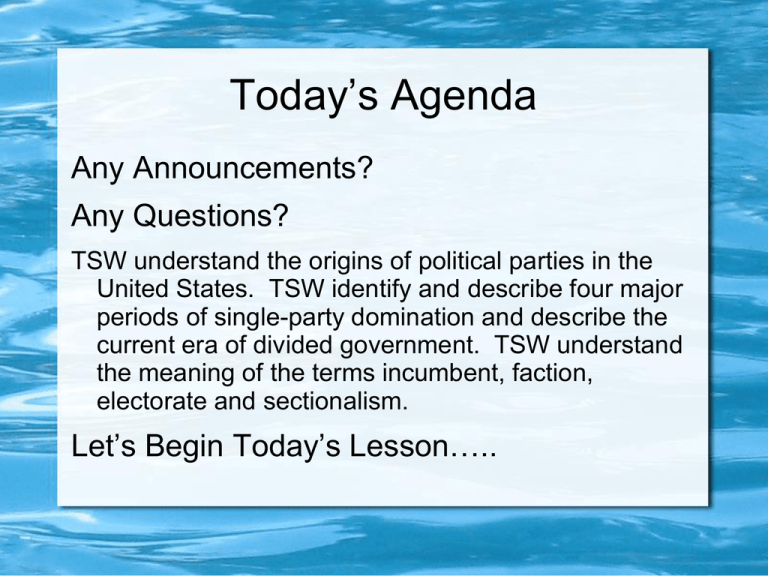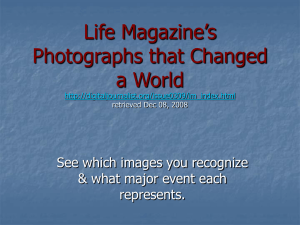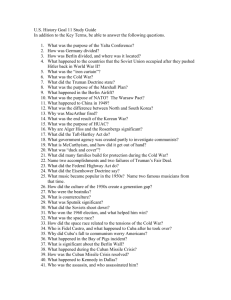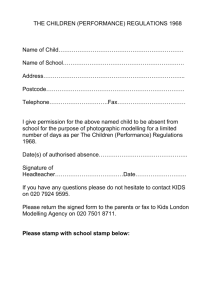Water
advertisement

Today’s Agenda Any Announcements? Any Questions? TSW understand the origins of political parties in the United States. TSW identify and describe four major periods of single-party domination and describe the current era of divided government. TSW understand the meaning of the terms incumbent, faction, electorate and sectionalism. Let’s Begin Today’s Lesson….. Political Parties Today's Standard: GC.25 Analyze the origin, development, and role of political parties. (H, P) Our First Parties.... This Song Explains It Well.... Agreed? The song told us about the FEDERALISTS and the DEMOCRATIC-REPUBLICANS. Alexander Hamilton: Pro-Business – Federalist Party Thomas Jefferson and James Madison: Pro-Agrarian – Democratic-Republican Party Four Major Eras 1800 to 1860 – Democrats won 13 of 15 presidential elections. Lost in 1840 and 1848. 1860 to 1932 – Republicans won 14 of 18 presidential elections. Lost in 1884, 1892, 1912 and 1916. 1932 to 1968 – Democrats won 7 of 9 presidential elections. Lost in 1952 and 1956. 1968 to Present – Divided Government Republicans have won 7 of 12. Our text book was printed before President Obama went 2-0. Era #1 – Era of the Democrats Thomas Jefferson was elected in 1800. The Federalist party lost this election and ceases to exist by 1816. Turn in your text book to page 134 and follow along with the timeline. Democratic-Republican party dominated elections until the mid-1820s when they began squabbling among themselves, forming factions of smaller groups disagreeing with other groups on various issues. Federalist Party is Gone The Whig Party fills the Vacuum Andrew Jackson (1829-1837) began what history professors call Jacksonian Democracy. The Whig Party formed to oppose Jacksonian Democracy. A pattern continues: The vast majority of Democratic party supporters lived in the South and the emerging West. The Whigs were supported by East Coast bankers, merchants, industrialist and owners of large southern plantations. A storm cloud is beginning to form on the horizon..... The Cloud Gets a Lot Closer! The 1850s witnessed a storm cloud getting larger and larger, more ominous and more dangerous.... Slavery – this issue caused both parties to fracture into different factions with various views on the topic of slavery. What does factions mean? In 1854, some Whigs splintered apart and became members of a brand new party, the Republican party. They ran a candidate for President in 1856, John C. Fremont, and their second candidate won in 1860. Hmm... Who could that be????? Republican Party is the Party of Lincoln Lincoln's win with the the Republican party marked a first and last in U.S. politics. A newer, 'third party', grew in four years into a major party and won a presidential election in its literally infancy. That feat has never been replicated. Era #2 – Era of the Republicans Lincoln's win in 1860 was one of major factors that caused the Civil War a year later. The Republican party would dominate presidential elections until 1932. Look at page 129. Read the paragraph containing the bolded word electorate and the paragraph that follows it. What does electorate mean? Sectionalism? 1932 – The Great Depression The Democrats grabbed the momentum back and dominated presidential elections from 1932 to 1968. Franklin Roosevelt won the 1932 election. Our country had been suffering from the Great Depression since 1929. FDR promised hope. A large part of the electorate blamed the Republican party for the Great Depression, pointing out how big business and the banks of the times were failing to stay open, costing people their jobs and their money. This video explains it well. If you were a customer of the Savings and Loan, who would you vote for? Do you think old mean Mr. Potter was portraying a Republican or a Democrat? Pivotal events, huge swings in party support. The Civil War. The Great Depression. 1968. 1968? 1968 “The year 1968 was a watershed year in American history — a turning point for the nation and its people. A year of vivid colors, startling sounds, and searing images. A turbulent, relentless cascade of events that changed America forever. From assassinations and conflicts, pop culture and free love, civil rights and women's rights, Americans questioned traditional values and authority that sent shockwaves across the country, including in Western Pennsylvania.” Heinz History Center - Heinz Museum Video.... Some key events of 1968 The turbulent 1960s reached a boiling point in 1968. In February, the Tet Offensive in Vietnam brought a shift in American public opinion toward the war and low approval ratings for the President. On April 4, Martin Luther King's assassination led to another wave of grief. Then waves of rioting swept America. Two months later, shortly after Robert Kennedy spoke to a crowd cheering his sweep in the California primary, an assassin named Sirhan Sirhan ended Kennedy's life. The nation was numb. - http://www.ushistory.org 1968 Democratic Convention was in the news Antiwar protesters flocked to Chicago to prevent the inevitable Hubert Humphrey nomination, or at least to pressure the party into softening its stance on Vietnam. The incumbent, Lyndon Johnson, decided not to run. What does incumbent mean? Mayor Richard Daley ordered the Chicago police to take a tough stance with the demonstrators. As the crowds chanted "The whole world is watching," the police bloodied the activists with clubs and released tear gas into the streets. The party nominated Humphrey, but the nation began to sense that the Democrats were a party of disorder. Violence Outside and Inside http://www.c-span.org/video/?74510-1/1968democratic-convention October of 1968 Oct 18th - US Olympic Committee suspends Tommie Smith & John Carlos for giving "black power" salute as a protest during victory ceremony. 1968 Begins a New Era The Republicans had a comparatively smooth campaign, nominating Richard Nixon as their candidate. Nixon spoke for the "Silent Majority" of Americans who supported the effort in Vietnam and demanded law and order. Alabama Governor George Wallace ran on the American Independent Party ticket. Campaigning for "segregation now, segregation tomorrow, segregation forever" Wallace appealed to many white voters in the South. His running mate, Curtis LeMay, suggested that the United States bomb Vietnam "back to the Stone Age." When the votes were tallied in November, Nixon cruised to an electoral vote landslide while winning only 43.4 percent of the popular vote. Some other Key 1968 Events Jan 21st - Vietnam War: Battle of Khe Sanh - One of the most publicized and controversial battles of the war begins. Lasting 77 days, the "siege" of Khe Sanh saw American and South Vietnamese forces suffer 703 killed, 2,642 wounded, and 7 missing. PAVN losses are not known with accuracy but are estimated at between 10,000-15,000 dead and wounded Feb 8th – Police officers kill 3 college students demonstrating at SC State (Orangeburg) – 30 unarmed black man protesting at a white-only bowling alley shot at by policemen. 1968 Continued Mar 4th - Martin Luther King Jr announces plans for Poor People's Campaign. Apr 4th - Martin Luther King Jr. assassinated in Memphis, Tennessee Apr 11th - President Johnson signs 1968 Civil Rights Act Apr 24th - Leftist students take over Columbia University, NYC 1968 Continued May 12th - "March of Poor" under Reverend Ralph Abernathy reaches Washington, DC Jun 6 – Robert Kennedy shot in California. Jul 23rd - Race riot in Cleveland, 11 killed including 3 policemen. Aug 25th - Arthur Ashe becomes 1st black to win US singles championship The Kiss That Shocked the South Star Trek - November, 1968 – Captain Kirk kisses Uhuru. NBC, nervous about the reaction from their Southern affiliates, insisted that an alternate take be shot, one without the kiss. NBC executives finally conceded and said, "Let's go with the kiss." 1968 Changed Our Nation Our nation's innocence was shattered by the events of 1968. After King was shot “Over the course of the following week, riots broke out in 125 cities nationwide.” In many instances the National Guard was required to quell the violence. In Washington, Chicago and Baltimore, it took tens of thousands of regular army soldiers and Marines. When they were over, some 39 people were dead, more than 2,600 injured and 21,000 arrested. The damages were estimated at $65m about $385m today.” - The Guardian Vietnam was at its height American Vietnam War-Related Deaths by Year 1956-60 9 1967 11,153 1961 16 1968 16,592 1962 52 1969 11,616 1963 118 1970 6,081 1964 206 1971 2,357 1965 1,863 1972 641 1966 6,143 1973 168 1974 178 Our Nation Has Never Been The Same 1968 was the beginning our our current Fourth Era of divided politic dominance. Obama's re-election may indicate that we may be witnessing a Fifth Era about to begin. What do you think? Political Parties Today's Standard: GC.25 Analyze the origin, development, and role of political parties. (H, P)




